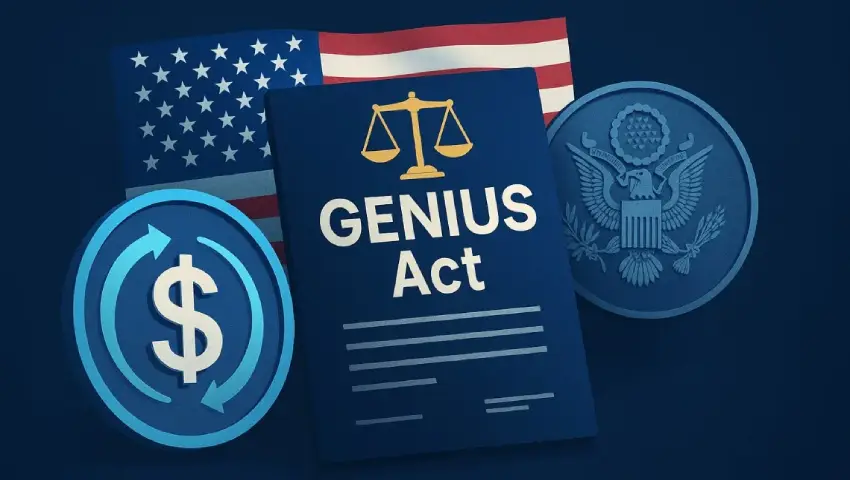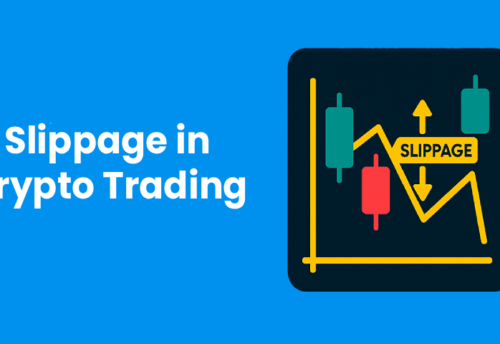
- 14/08/2025
- MyFinanceGyan
- 768 Views
- 2 Likes
- Cryptocurrency
GENIUS Act Becomes Law: U.S. Adopts First Federal Stable coin Regulation
July 18, 2025, marked a milestone for U.S. crypto regulation as President Trump signed the GENIUS Act into law. This is the country’s first comprehensive federal framework for payment stablecoins, reshaping how they’re issued, sold, and used nationwide. The bill cleared the Senate on June 17, 2025, and the House on July 17, 2025, setting in motion a structured oversight system for stablecoins. It limits issuance to approved entities, mandates 1:1 reserve backing, and introduces strict compliance, transparency, and consumer protection standards. The law will take effect on the earlier of:
- January 18, 2027 (18 months after enactment), or
- 120 days after federal regulators issue final implementation rules.
Once active, all U.S. stablecoin issuers must meet its requirements. Exchanges, custodians, wallet providers, and payment apps get a three-year transition period—by July 18, 2028, they can only handle stablecoins issued by approved issuers.
What Counts as a "Payment Stablecoin"?
Under the GENIUS Act, a payment stablecoin is a digital asset:
- Intended for payment or settlement, and
- Backed by an issuer who:
- Promises redemption for a fixed monetary value, and
- Maintains a stable value relative to that fixed amount.
Not included:
- National currencies
- Bank deposits (including blockchain-recorded ones)
- Securities or commodities under existing U.S. laws
This classification removes SEC and CFTC oversight of covered stablecoins—a sharp change from past enforcement actions under the Biden administration.
Who Can Issue Stablecoins?
Only a “Permitted Payment Stablecoin Issuer” (PPSI) may operate in the U.S. A PPSI must be a U.S.-formed entity that is either:
- A subsidiary of an insured depository institution approved by a banking regulator,
- A federally approved nonbank or national bank branch authorized by the OCC, or
- A state-approved issuer regulated under a certified framework.
Unlicensed issuance can bring fines of up to $1M per violation and up to five years in prison.
Foreign Issuers:
Non-U.S. issuers can operate in the U.S. if they:
- Are regulated under a comparable foreign regime,
- Register with the OCC, and
- Meet technical requirements.
Issuers from sanctioned or high-risk jurisdictions are banned.
Key Requirements for Issuers:
Approved issuers must comply with:
- 1:1 reserve backing for all stablecoins in circulation
- Public redemption policies
- Monthly reserve composition disclosures
- No rehypothecation of reserves
- Limits on high-risk activities (e.g., lending, proprietary trading)
- Segregation of customer assets
- Compliance with AML/KYC and sanctions laws
- Strong capital, liquidity, and risk management controls
Yield or interest payments on stablecoins are prohibited.
Digital Asset Service Providers:
From July 18, 2028, exchanges, custodians, and payment platforms in the U.S. may only handle PPSI-issued stablecoins. Decentralized, non-custodial tools remain exempt.
Federal vs. State Oversight:
- Over $10B in issuance → Federal supervision (OCC, Fed, FDIC, NCUA)
- $10B or less → State oversight, if the regime matches federal standards
- Large state issuers must shift to federal oversight unless granted a waiver
Consumer Protections & Bankruptcy Rules:
The Act gives unprecedented protections to stablecoin holders:
- Reserves are excluded from bankruptcy estates—treated as customer property
- Holders have priority claims to reserves, ahead of all other creditors
- If reserves fall short, holders get a superpriority claim for the balance
Why It Matters:
The GENIUS Act cements stablecoins as a distinct asset class in U.S. law, giving regulatory clarity for the first time. Issuers—both domestic and foreign—must now navigate strict approval and compliance processes. Rulemaking over the next 18 months will shape the finer details, making early preparation critical for any company operating in this space.
Disclaimer:
This article is for educational purposes only and reflects the author’s personal views. It does not constitute investment advice or product recommendations.



